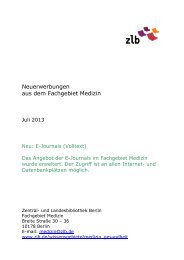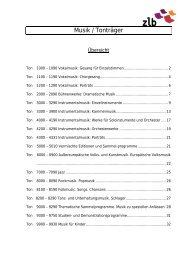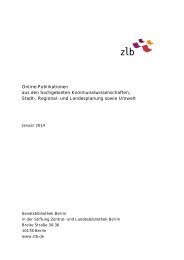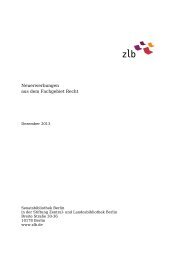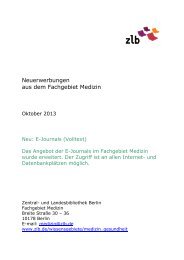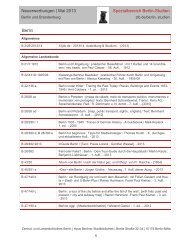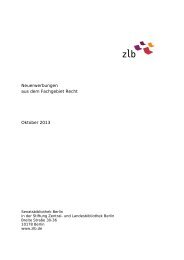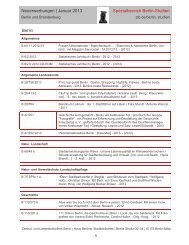12. Exkurs: Die Frankfurter Schule - Zentral- und Landesbibliothek ...
12. Exkurs: Die Frankfurter Schule - Zentral- und Landesbibliothek ...
12. Exkurs: Die Frankfurter Schule - Zentral- und Landesbibliothek ...
Sie wollen auch ein ePaper? Erhöhen Sie die Reichweite Ihrer Titel.
YUMPU macht aus Druck-PDFs automatisch weboptimierte ePaper, die Google liebt.
Husserl, Heidegger, Funke <strong>und</strong> die deutsche Philosophie im 20. Jahrh<strong>und</strong>ert<br />
stitute” while the philosopher served on French diplomatic missions. Bergson resigned<br />
in 1921 in order to dedicate himself to his writing and to his work on behalf<br />
of the League of Nations. From 1921 to 1926 he acted as president of the committee<br />
on international cooperation of the League of Nations.<br />
Bergson enjoyed the status of a cult figure in the years between World Wars.<br />
Although not a practicing Jew, Bergson refused the Vichy government’s offers to<br />
excuse him from the scope of their anti-Semitic laws. He decided to join the persecuted<br />
and registered himself at the end of 1940 as a Jew, although his religious<br />
thinking had brought him closer to Catholicism. Bergson died of bronchitis on<br />
January 3, 1941. For his last seventeen years he had suffered from crippling arthritis.<br />
“There is nothing in philosophy which could not be said in everyday language”,<br />
Bergson told once in an interview. As a stylist he could be compared to Russell or<br />
Berkley, but his ideas were often high-flown and difficult to follow. In his first major<br />
work, Time and Free Will (1889), Bergson aimed to show how pseudoproblems<br />
about the will and its freedom have arisen from a false phenomenology of mental<br />
states - essentially, a tendency to conceive and describe them in spatial terms. Human<br />
experience does not perceive real life as a succession of demarcated conscious<br />
states, progressing along some imaginary line, but rather a continuous flow. Bergson<br />
made the distinction between the concept and experience of time. While the<br />
physicist observes objects and events in succession, time is presented to consciousness<br />
as duration - an endlessly flowing process. Bergson argued that the ‘real time’ is<br />
experienced as duration and apprehended by intuition, not through separate operations<br />
of instinct and the intellect.<br />
In An Introduction to Metaphysics (1903) Bergson saw that the intuition, the direct<br />
apprehension of process, as the discoverer of truth - intuition, not analysis, reveals<br />
the real world. Bergson’s treatment of intuition was not coherent - sometimes it<br />
referred to getting bright ideas, which presupposes intellectual hard work. Sometimes<br />
intuition is the method of philosophy like intellect is of mathematics. His<br />
concept of élan vital, “creative impulse” or “living energy”, was developed in Creative<br />
Evolution, his most famous book. In 1914 all of Bergson’s writings, but most especially<br />
Creative Evolution, were placed upon the list of books devout Catholics were<br />
forbidden to read. After its appearance twenty-five years elapsed before Bergson<br />
published another major work, The Two Sources of Morality and Religion (1932). The Creative<br />
Mind, published two years later, was a collection of essays and other writings.<br />
Although Laughter (1900) is not among Bergson’s best-known studies, Arthur<br />
Kloestler considered it as important for his book The Act of Creation as (1964)<br />
Freud’s classic Wit and its Relations to the Unconscious. Bergson defined the comic as<br />
the result of the sense of relief we feel when we feel ourselves from the mechanistic<br />
and materialistic - his examples were the man-automaton, the puppet on<br />
strings, Jack-in-the Box, etc. “A situation is always comic”, he wrote, “if it participates<br />
simultaneously in two series of events which are absolutely independent of<br />
each other, and if it can be interpreted in two quite different meanings.” He saw<br />
laughter as the corrective punishment inflicted by society upon the unsocial individual.<br />
“It seems that laughter needs an echo. Our laughter is always the laughter<br />
of a group.”<br />
Bergson had been interested in Spencerian evolutionism in his youth, but he<br />
later abandoned Spencer’s view placing intuition as the highest human faculty. In<br />
Creative Evolution Bergson argued that the creative urge, not the Darwinian concept<br />
of natural selection, is at the heart of evolution. Man’s intellect has developed in the<br />
course of evolution as an instrument of survival. It comes to think inevitably in ge-<br />
324



